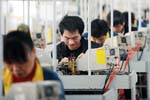Fiscal policy to maintain steady growth
Updated: 2012-02-02 09:05
By Wei Tian (China Daily)
|
|||||||||||
BEIJING - A proactive fiscal policy is a "feasible and indispensable" option to allow China to maintain steady development amid the global economic downturn, said Finance Minister Xie Xuren on Wednesday.
Analysts said an aggressive fiscal policy would be on a "controllable level", and the focus of further fiscal operations will fall on structural tax cuts.
"Domestic and global turmoil have not changed the fundamentals of China's economy, and fiscal policies will have to continue playing a vital role in maintaining steady development," Xie wrote in an article for the latest issue of Qiushi Magazine.
Xie said that further expenditure is needed in areas such as key projects under construction and those in the planning stage. Other areas include improving people's livelihoods and bolstering the upgrading of smaller businesses.
At an executive meeting of the State Council, China's cabinet, on Tuesday, Premier Wen Jiabao said that the government will work to ensure capital flow in key projects to keep investment growing at a steady level.
The government will also step up credit support for the real economy, especially for small and medium-sized enterprises (SMEs), said Wen, who also promised wider market access to invigorate private business.
"China has paid great attention to risk control when implementing proactive fiscal policies, and its fiscal deficit and debt level is still within the safe zone," Xie said.
"Therefore, to continue to carry out such policies is both necessary and possible," he said.
China's fiscal revenue surged by nearly a quarter to a record 10.37 trillion yuan ($1.64 trillion) in 2011, while annual fiscal spending stood at 10.89 trillion yuan, leaving the country with a deficit level at 1.1 percent of GDP.
"In 2012, the deficit level will remain equivalent to, if not slightly above, that of the previous year," said Gao Peiyong, head of the Finance and Trade Economics Institute under the Chinese Academy of Social Sciences.
Gao denied that incremental expenditure will be the focus of policy guidance, and said tax cuts will be the main carrier of further fiscal operations.
"To stabilize prices is still a relatively more important issue, thus the fiscal policy will only be controllably aggressive," he said.
To achieve "structural" tax cuts and lower the overall tax burden, Gao called for less indirect tax to be paid by companies - which currently provides 70 percent of China's tax income with the costs eventually being passed on to customers - and more direct taxes on consumers.
Jia Kang, director of the Finance Ministry's Fiscal Science Research Center, said last year's tax cuts generated a lot of headlines, but actually provided very little help for SMEs.
"These tax cuts are more of a policy signal, or a gesture. In practice, the financing difficulties are a more urgent problem for SMEs," Jia said.
"The central government's ambition on tax cuts may encounter strong resistance from local authorities," said Ye Tan, a financial commentator and professor at Shanghai's Fudan University.
Some experts say they're confident that China can control any risks.
"In the event of a further slowdown in the global economy, our sense is that China and most Asian economies have room for a looser fiscal policy response," said Anoop Singh, director of the Asia and Pacific Department at the International Monetary Fund (IMF).
Singh said the IMF doesn't expect China to experience a "hard landing", with growth likely to remain well above 8 percent this year and in 2013.
"There are risks, but they're not systemic. I don't think they will derail growth," according to Singh.
Related Stories
Maintaining proactive fiscal policy 'necessary' 2012-02-02 03:23
China to continue proactive fiscal policy 2011-01-17 09:07
China should maintain prudent monetary policy: official 2011-07-11 13:32
CASS urges steady policy course in 2012 2011-12-08 09:29
- Uptick in official PMI 'signals stabilization'
- Stronger ties with mainland will buoy HK
- Fiscal policy to maintain steady growth
- Scientific input to seed agriculture
- China vows to aid small businesses
- Maintaining proactive fiscal policy 'necessary'
- Speed up industrial restructure and upgrade
- Net int'l investment position at $1.89 trln








